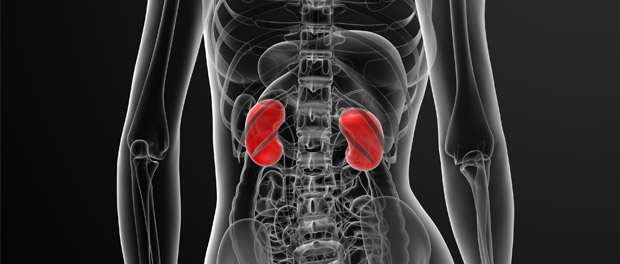
Injury to tissue in major organs such as the kidney causes inflammation which can lead to cell damage or cell death in the affected area. The human body is programmed with a normal physiological wound repair process for the damaged tissue – similar to the formation of a scar when we injure or damage our skin. Normally, once the injury has been contained, the wound repair process stops. Fibrosis is a pathological process similar to normal tissue wound repair; however, it does not self terminate. Instead, there is excessive deposit of (ECM) extracellular matrix (like scar formation) and the process persists even after the injury has been resolved (1).
Pathological fibrosis can lead to organ failure and death. Since the same cellular signals mediate physiological wound repair and pathological fibrosis, it is difficult to determine the mechanisms and pathways which lead to a pathogenic state. Recent studies have shown that epigenetic factors may play a role in preventing fibroblasts from returning to a resting state, permitting them to be continuously activated which ultimately results in kidney fibrosis. DNA methylation of CpG islands in the promoter region of a gene results in repression of gene expression. The RASAL1 gene is one of several genes that was shown to be hypermethylated in fibrotic human kidney fibroblasts and suppressed in fibrotic kidneys (2). Loss of RASAL1 expression was shown to result in the metabolic changes observed in fibrotic fibroblast activation and also correlated with experimental renal fibrosis. Hypermethylation of RASAL1 is mediated by one of three DNA-methyltransferases, DNMT1, resulting in hyperactive Ras signaling and increased fibroblast activation and proliferation which drives renal fibrosis.
Scientists at the Georg August University in Germany investigated whether reversing the hypermethylation of the RASAL1 gene by administering the antifibrotic factor, bone morphogenic protein-7 (BMP-7), could prevent kidney fibrosis. Bone morphogenic protein-7 is an endogenous antifibrotic factor that can antagonize the fibrogenic action of cytokines involved in fibrogenesis (3). Their findings propose a new mechanism to investigate for development of potential therapeutic targets for the treatment of kidney fibrosis.
Their findings are summarized below:
- BMP-7 can mediate reversal of DNA hypermethylation
- Kidney fibrosis can be inhibited by the administration of BMP-7 and is associated with normalization of RASAL1 promoter hypermethylation
- Hypermethylation reversal is achieved through the action of the TET3 enzyme which promotes DNA demethylation through hydroxylase activity
Source: Read more about their findings and get all of the information here: Tampe et al, Tet3-Mediated Hydroxymethylation of Epigenetically Silenced Genes Contributes to Bone Morphogenic Protein 7-Induced Reversal of Kidney Fibrosis. Journal of the American Society of Nephrology, published ahead of print January 30, 2014.
References:
(1) Zeisberg E and Zeisberg M, The role of hypermethylation in fibroblast activation and fibrogenesis. Journal of Pathology 2013; 229: 264-273
(2) Bechtel et al, Methylation determines fibroblast activation and fibrogenesis in the kidney. Nat Med 2010; 16: 544-550
(3) Liu Y, Renal fibrosis: New insights into the pathogenesis and therapeutics. Kidney International 2006; 69: 213-217

